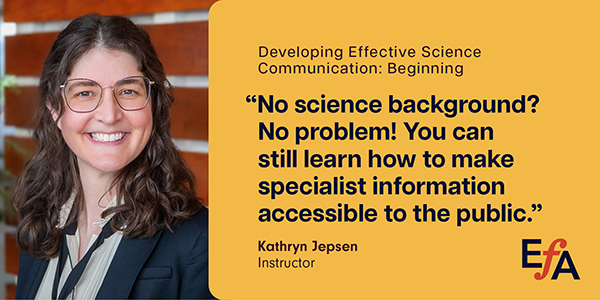Science communication must attract the reader’s attention, hold that attention while conveying important information, and deliver on its promises to come to a satisfying conclusion. In this six-week course, we’ll look to the worlds of journalistic editing, fiction editing, and academic editing for essential tools to ensure that a piece of science writing works from beginning to end. ($350 for guests, $280 for members. Early bird discount: Register before November 10 and get 10% off!)

|
2/11/2026 to 3/24/2026
|
|
When:
|
Six-week course, February 11–March 24
|
|
Where:
|
Online
|
|
Presenter:
|
Kathryn Jepsen
|
|
Contact:
|
EFA Education
education@the-efa.org
212-920-4816, ext. 806
|
|
|

Important Information About Our Instructor-Led Courses
Our courses are asynchronous, meaning you never need to be at your computer at any specific hour. Instructors provide guidance through forum discussions and feedback on assignments. More information about our courses and webinars is available
here.
After you place your order, your course will be added to your personal course library on our education site. That site has different login information from the main EFA site. Please check your email for
information on how to access the course.
Registration is limited to 29 students. If the course is full, you may join the waitlist to be notified if seats open up. If these dates don’t work for you, or if no seats are available, sign up to be notified when the next session of this course is open for registration.
Science editors work with science writers to communicate specialist information to non-specialist audiences. They educate the public about the importance of scientific results, convince funding agencies to support proposed projects, and enlighten museum
visitors about the meaning of new exhibits.
To succeed in the field of science communication, science editors must ensure that writers do more than just lay out the facts. Science communication must also attract the reader’s attention, hold that attention while conveying important information,
and deliver on promises to come to a satisfying conclusion.
In this six-week course, we'll look to the worlds of journalistic editing, fiction editing, and academic editing for essential tools to ensure that a piece of science writing works from beginning to end. Through weekly assignments, you'll put that advice
into practice, with plenty of instructor feedback and peer discussion to guide you.
- Week 1 will cover common story structures and how they relate to “the ladder of abstraction.”
- Week 2 will explain how to hook the reader with an effective beginning.
- Week 3 will go over how to keep the reader engaged at the line and paragraph level with emphasis and clarity.
- Week 4 will examine how to help a writer develop their craft through editorial comments.
- Week 5 will show how to use details to sincerely elicit emotion.
- Week 6 will address making sure that a story delivers on its promises and finishes strong.
Weekly assignments should take less than an hour to complete (with opportunities for additional practice). The class will use a forum for discussions of readings, and the instructor will host two class get-togethers over Zoom.
This class is designed for science editors and aspiring science editors, though it may be helpful to any editor who works to translate specialist language used among experts into clear language accessible to a broad audience. It will be especially helpful
to editors who edit shorter-form science writing, such as articles and museum exhibits, but almost every principle taught will also apply in editing book-length science writing as well. Copyediting and proofreading are separate skills that won't be
addressed in this course.
Required tools:
- Microsoft Word (preferred) or Google Docs
Viewing the introductory webinar, "Effective Science Editing: Lessons from Fiction and Academia," isn't required but may be beneficial.
Our students say...
Each lesson was centered on a theme, and the instructor was both able to focus on specifics around that theme, but also could easily tie the lesson back to the main principles established in earlier lessons. The homework and discussion assignments
were a great way to interact with classmates, too. —D.U.
Kathryn is an extremely knowledgable person and clearly has so much to share. I enjoyed learning about the ins and outs of scientific editing from her and the course was excellently structured and paced. —B.A.
Prerequisites
This course is open to students at all levels.
For more than a decade, Kathryn Jepsen (she/her) has served as editor in chief of Symmetry, an online magazine about particle physics and astrophysics published by two US national laboratories. She has a master's degree in journalism, with a focus on science writing, from Northwestern University, and she has studied creative writing and the developmental editing of fiction.
|